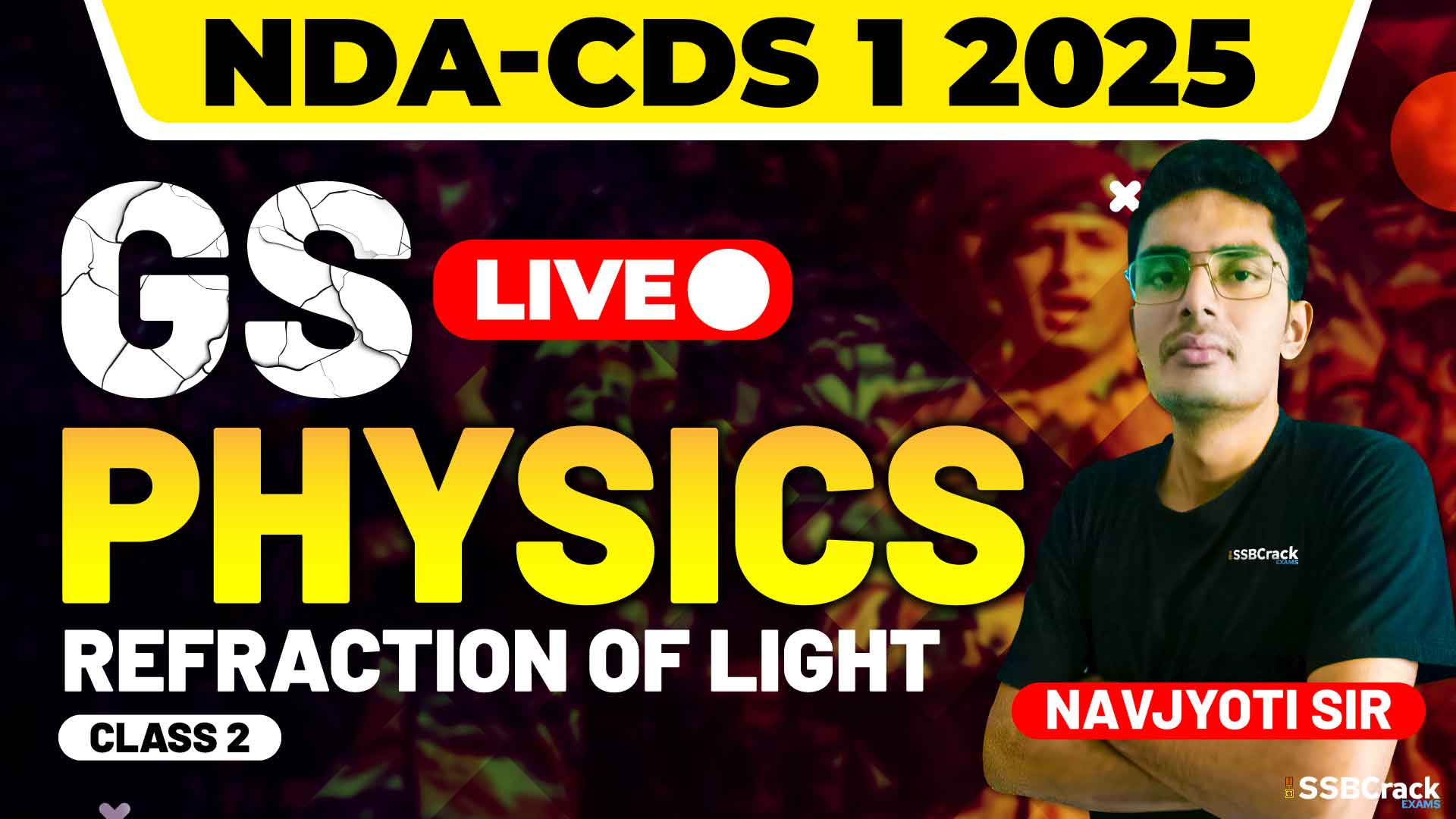Refraction of Light is a critical topic in Physics, frequently featured in the National Defence Academy and Naval Academy (NDA-NA) Exam – Paper II – General Ability Test (GAT) and the General Knowledge (GK) Paper of the Combined Defence Services (CDS) Exam. To strengthen conceptual understanding and problem-solving skills, a recent class focused on practicing Multiple Choice Questions (MCQs) based on this topic, including previous years’ questions and new ones designed to align with the exam pattern.
This blog provides an overview of the class, highlights the subtopics covered, and discusses effective strategies for preparing for Refraction of Light in these competitive exams.
Overview of the Class
The session was structured to reinforce the understanding of Refraction of Light and prepare students for MCQs commonly asked in the NDA-NA and CDS exams. It was an engaging class that combined conceptual clarity with hands-on practice, covering the following:
1. Focus on Exam-Relevant Subtopics
The MCQs targeted the most critical subtopics within Refraction of Light, such as:
- Laws of Refraction: Questions centered around understanding and applying these laws in various scenarios.
- Refractive Index: Problems involved comparing materials based on their refractive indices and analyzing the bending of light.
- Lenses (Convex and Concave): The emphasis was on identifying image properties, magnification, and practical applications of lenses.
- Total Internal Reflection (TIR): Questions covered its conditions, critical angle, and real-world examples like optical fibers, mirages, and sparkling diamonds.
- Atmospheric Refraction: MCQs focused on natural phenomena such as twinkling stars and apparent shifts in celestial objects.
By tackling questions from these subtopics, students strengthened their grasp of theoretical concepts and gained practical insights.
2. Practice with Previous Years’ Questions
Previous years’ exam papers provide a clear idea of the types of questions frequently asked in competitive exams. The class incorporated:
- Questions from past NDA-NA and CDS exams to familiarize students with recurring patterns and trends.
- Analysis of these questions to identify common themes, such as image formation, real-life applications, and problem-solving scenarios.
3. Expected Questions Based on Exam Pattern
To prepare for potential questions in upcoming exams, students practiced newly curated MCQs modeled on recent trends. These questions emphasized problem-solving and conceptual application, mirroring the increasing focus on real-world relevance in competitive exams.
4. Interactive Discussions and Explanations
Each question was followed by a detailed explanation, helping students understand:
- Why a particular option was correct.
- How to eliminate incorrect options.
- The underlying concepts and reasoning processes.
This interactive approach encouraged active participation and ensured clarity in understanding.
Strategies to Prepare Refraction of Light for NDA-NA and CDS Exams
To excel in the Physics section, particularly in topics like Refraction of Light, aspirants should adopt a focused and strategic approach.
1. Strengthen Conceptual Understanding
Before diving into MCQs, ensure you have a solid grasp of the fundamental concepts:
- Understand what refraction is and why it occurs.
- Learn the differences between concave and convex lenses, as well as their image-forming properties.
- Familiarize yourself with atmospheric and total internal refraction phenomena.
2. Solve Previous Years’ Papers
Practicing past questions is an invaluable strategy for identifying important topics and familiarizing yourself with the question format. It also helps in time management during the exam.
3. Practice Application-Based Questions
Focus on real-world applications of refraction, such as:
- How optical fibers function.
- The science behind mirages in deserts.
- Why stars appear to twinkle.
Application-based questions test not only your knowledge but also your ability to relate concepts to everyday experiences.
4. Develop Problem-Solving Skills
Many MCQs require analytical thinking and problem-solving skills. Practice questions that challenge you to apply your knowledge in new and creative ways.
5. Create Flashcards for Quick Revision
Make concise notes or flashcards highlighting key points, such as:
- The behavior of light in different mediums.
- Conditions for total internal reflection.
- Properties of concave and convex lenses.
These can be handy for quick revision before the exam.
6. Learn Through Diagrams
Refraction is best understood visually. Practice drawing neat and labeled ray diagrams for:
- Refraction through lenses.
- Total internal reflection in optical fibers.
- The apparent shift of stars due to atmospheric refraction.
Such diagrams not only help in understanding but also aid in answering descriptive questions effectively.
7. Focus on Accuracy and Speed
While practicing MCQs, pay attention to:
- Accuracy: Avoid guesswork; focus on logical elimination of wrong answers.
- Speed: Time management is crucial, so practice solving questions within a set time limit.
Importance of Practicing MCQs
MCQs are not just about testing knowledge; they also help you develop critical thinking and problem-solving abilities. By practicing MCQs on Refraction of Light, students can:
- Familiarize themselves with the type and difficulty level of questions.
- Identify weak areas and work on improving them.
- Gain confidence in tackling the Physics section of competitive exams.
Conclusion
The recent class on practicing MCQs on Refraction of Light was an excellent opportunity for students to solidify their understanding and hone their problem-solving skills. Through a mix of past questions, expected ones, and detailed explanations, the session offered a comprehensive preparation approach tailored to the NDA-NA and CDS exam patterns.
To prepare effectively for Refraction of Light, aspirants should focus on building a strong conceptual foundation, practicing application-based questions, and refining their speed and accuracy. By staying consistent in their efforts and approaching the topic strategically, students can not only master this essential topic but also boost their overall performance in the Physics section.
Remember, preparation is a journey, and each step—whether it’s practicing MCQs or revising concepts—brings you closer to success. Keep practicing, stay confident, and shine bright on exam day!







